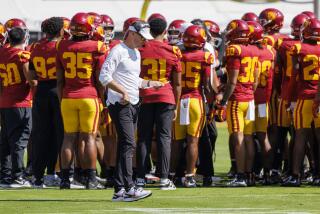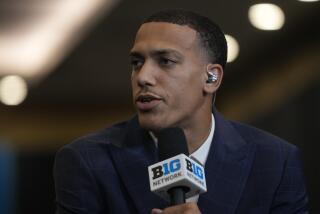USC’s Johnson makes a run with extra purpose
Big Dad showed up at nearly every practice, stood on the sidelines near that sun-splashed part of the field where running backs work. While everyone else was tearing down Stafon Johnson, Big Dad came to hold him up.
“He kept telling me I was better than what I was showing,” Johnson said. “He never stopped believing in me.”
Big Dad showed up at nearly every game, climbing the Coliseum steps long after most of Johnson’s Compton friends and neighbors were too furious to follow him. Instead of mourning his grandson’s absence from the huddle, he celebrated his resolve to stay at the school.
“He always told me he was proud of me for hanging in there,” Johnson said. I’ll never forget that.”
For seemingly every minute of Johnson’s failed first season as a USC running back, Big Dad was everywhere.
Then, suddenly, he was nowhere, Larry Mallory dying last spring of a heart attack at age 66, robbing Johnson of a grandfather, a father figure, and a best friend.
“One day he was fine,” Johnson said softly, confusion still choking his voice. “The next day he was gone.”
Johnson spent several days in hiding. Then he tearfully stood up at Big Dad’s funeral with an announcement.
He said, despite all evidence otherwise, Big Dad wasn’t going anywhere. Then he tapped his chest above his heart.
“Big Dad is going to live in me,” he said. “Big Dad is going to run through me.”
Five months later, that heart has seemingly grown twice its normal size, and Big Dad is flying.
When the Trojans play host to Idaho in the season opener Saturday, their two handfuls of running backs may be squeezed down to a most unlikely one, and it is Stafon Johnson.
“We have watched him grow up,” Coach Pete Carroll said. “And now he is ready.”
Ready to shoulder most of the carries in the wake of nagging injuries to C.J. Gable, Allen Bradford, Chauncey Washington and Joe McKnight.
Ready to be the type of Trojans running back that the inner city has waited years to spawn.
Ready to make someone proud.
“Big Dad is here right now,” Johnson said after practice Thursday, finally smiling. “Running right through me.”
Johnson showed up on campus last summer as the Great Dorsey Hope, the kid who could use a football to connect Heritage Hall to south Los Angeles in a way that lumbering defensive linemen just can’t.
He was ready to have his superstitions-are-for-fools No. 13 jersey emblazoned in cardinal and gold.
Instead, after failing to give full and consistent efforts in fall practice, his jersey was scout-team black.
“When they put that black jersey on him, I could see his face, he looked like he had just gone crazy,” said his father, Stan. “He was demoralized.”
He was, it turns out, the Great Dorsey Dud.
He had the speed but not the work ethic. He had the strength but not the discipline. He was the star of scrimmages, but Carroll gives higher grades for practices.
The two USC coaches who had recruited him had left for other schools, and, at times, he felt abandoned.
“He didn’t know how things worked, he wasn’t sure of all the rules, and he had lost his sounding boards,” said his mother, Kim Mallory. “He really lost trust in the program.”
Johnson received so many questioning phone calls from reporters and friends, his mother changed his cellphone number.
There was such anger in the neighborhood, his father had difficulty finding friends to accompany him to the games.
“Coming from this city, there was a lot of pressure on Stafon,” Carroll said. “He had a lot to handle.”
Often in these situations, highly touted players will transfer, witness Emmanuel Moody.
But Johnson isn’t like other players. Raised by a tough single mother, he has no tattoos, no earrings, doesn’t even drink soda, and rarely wears a white shirt or crooked cap lest he be mistaken for a troublemaker.
Instead of hanging out with friends, Johnson hangs out in a church. Instead of running from the pressure, Johnson embraced it.
“This was my town, my city, my friends,” Johnson said. “I wasn’t going to leave them. Whatever I did, I wanted to do it here.”
Backed by this resolve, and by a grandfather who showed up nearly every day to encourage him, the L.A. kid slowly began to figure it out. By the time the Trojans had finished their Rose Bowl victory over Michigan, he was working his way back into the good graces of the coaches.
He was, however, still a kid who had carried the ball only three times the entire season. He still needed to show the Trojans his fourth gear.
In the spring, Big Dad and Johnson’s mother visited Carroll to discuss his future. Big Dad returned from the meeting to offer Johnson three words of advice.
“Run, Stafon, run.”
Recalled his mother: “He said those three words over and over. He never wanted Stafon to forget them.”
A week after that meeting, Larry Mallory died a death so shocking, even today his grandson isn’t sure what happened.
“I was sitting with him in the hospital, he had just had some tests,” Johnson said. “Then I went to the lobby for a little bit, and they came out and told me he was dead. I still don’t understand it.”
Big Dad’s gold cross chain now rests on Johnson’s neck. Big Dad’s name will be forever resting on his lips.
Before taking the field, Johnson crosses himself, then looks up at the sky.
“I holler up there to Big Dad, talk to him about things, ask for help,” he said.
And how does Big Dad answer?
“You can tell what he says to me by watching me play,” Johnson said.
On Saturday at the Coliseum, the singularly intended words could be shared by thousands.
Run, Stafon, run.
--
Bill Plaschke can be reached at [email protected]. To read previous columns by Plaschke, go to latimes.com/plaschke.
More to Read
Go beyond the scoreboard
Get the latest on L.A.'s teams in the daily Sports Report newsletter.
You may occasionally receive promotional content from the Los Angeles Times.







